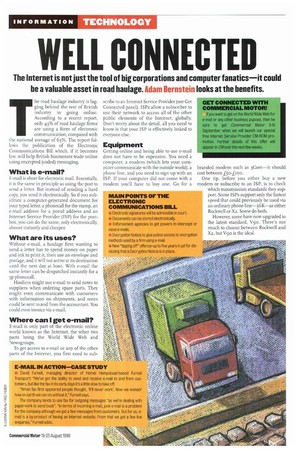WELL CONNECTED
Page 45

If you've noticed an error in this article please click here to report it so we can fix it.
The Internet is not just the tool of big corporations and computer fanatics it could be a valuable asset in road haulage. Adam Bernstein looks at the benefits.
The road haulage industry is lagging behind the rest of British industry in going online, According to a recent report, only 43% of road haulage firms are using a form of electronic communication, compared with the national average of 63%. The report follows the publication of the Electronic Communications Bill which, if it becomes law, will help British businesses trade online using encrypted (coded) messaging.
What is e-mail?
E-mail is short for electronic mail. Essentially, it is the same in principle as using the post to send a letter. But instead of sending a hard copy, you send it electronically. So if you substitute a computer-generated document for your typed letter, a phonecall for the stamp, an e-mail address for a postal address and an Internet Service Provider (ISP) for the postbox, you can do the same, only electronically, almost instantly and cheaper.
What are its uses?
Without e-mail, a haulage firm wanting to send a letter has to spend money on paper and ink to print it, then use an envelope and postage, and it will not arrive at its destination until the next day at least. With e-mail the same letter can be despatched instantly for a sp phonecall.
Hauliers might use e-mail to send notes to suppliers when ordering spare parts. They might even communicate with customers with information on shipments, and notes could be sent to and from the accountant. You could even invoice via e-mail.
Where can I get e-mail?
E-mail is only part of the electronic online world known as the Internet, the other two parts being the World Wide Web and Newsgroups.
To get access to e-mail or any of the other parts of the Internet, you first need In sub
scribe to an Internet Service Provider (see Get Connected panel). I S Ps allow a subscriber to use their network to access all of the other public elements of the Internet, globally. Don't worry about the detail, all you need to know is that your ISP is effectively linked to everyone else.
Equipment
Getting online and being able to use e-mail does not have to be expensive. You need a computer, a modem (which lets your computer communicate with the outside world), a phone line, and you need to sign up with an ESP. If your computer did not come with a modem you'll have to buy one. Go for a
branded modern such as 3Com it should cost between L50-iloo.
One tip, before you either buy a new modem or subscribe to an ISP, is to check which transmission standards they support. Some ISPs support only the fastest speed that could previously be used via an ordinary phone line—OK—as either Rockwell or X2. Some do both.
However, some have now upgraded to the latest standard, V9o. There's not much to choose between Rockwell and X2, but V90 is the ideal.








































































































